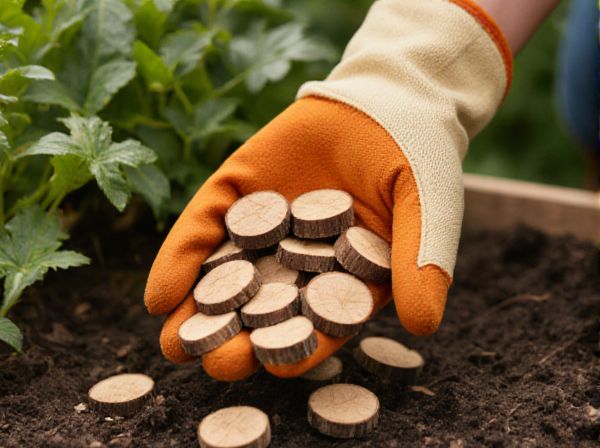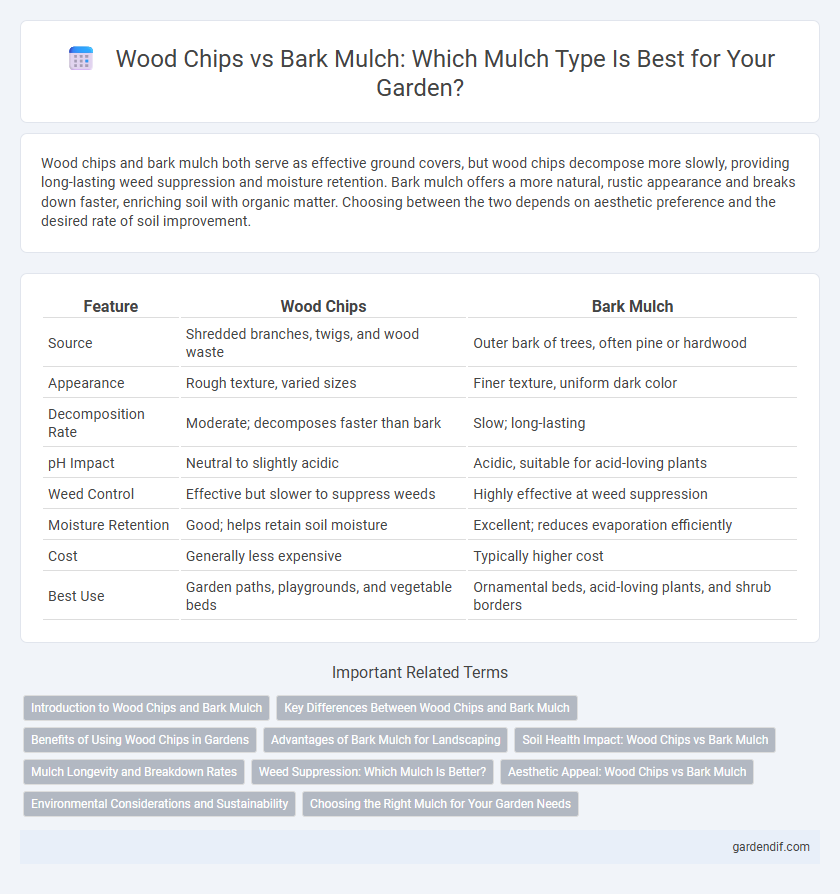
Wood chips vs bark mulch Illustration
Wood chips and bark mulch both serve as effective ground covers, but wood chips decompose more slowly, providing long-lasting weed suppression and moisture retention. Bark mulch offers a more natural, rustic appearance and breaks down faster, enriching soil with organic matter. Choosing between the two depends on aesthetic preference and the desired rate of soil improvement.
Table of Comparison
| Feature | Wood Chips | Bark Mulch |
|---|---|---|
| Source | Shredded branches, twigs, and wood waste | Outer bark of trees, often pine or hardwood |
| Appearance | Rough texture, varied sizes | Finer texture, uniform dark color |
| Decomposition Rate | Moderate; decomposes faster than bark | Slow; long-lasting |
| pH Impact | Neutral to slightly acidic | Acidic, suitable for acid-loving plants |
| Weed Control | Effective but slower to suppress weeds | Highly effective at weed suppression |
| Moisture Retention | Good; helps retain soil moisture | Excellent; reduces evaporation efficiently |
| Cost | Generally less expensive | Typically higher cost |
| Best Use | Garden paths, playgrounds, and vegetable beds | Ornamental beds, acid-loving plants, and shrub borders |
Introduction to Wood Chips and Bark Mulch
Wood chips and bark mulch serve distinct roles in landscaping and gardening, offering unique textures and decomposition rates. Wood chips, derived from chipped branches and tree limbs, provide robust ground cover and improve soil aeration while decomposing slowly. Bark mulch, sourced mainly from tree bark, offers a finer texture that retains moisture effectively and suppresses weeds, enhancing soil health.
Key Differences Between Wood Chips and Bark Mulch
Wood chips are larger, irregularly shaped pieces primarily made from chipped branches and trunks, providing better aeration and longer decomposition time compared to bark mulch, which consists of smaller, more uniform pieces derived from the bark of trees. Bark mulch tends to retain moisture more effectively and offers a richer, darker color that enhances garden aesthetics, while wood chips are often preferred for pathways and playgrounds due to their durability and cushioning properties. Both mulch types suppress weeds and regulate soil temperature but differ significantly in texture, breakdown rate, and moisture retention capabilities, influencing their best use cases in landscaping and gardening.
Benefits of Using Wood Chips in Gardens
Wood chips improve soil aeration and drainage while slowly decomposing to enrich nutrient content, supporting healthy root development in garden plants. Their coarse texture helps suppress weed growth and retain soil moisture, reducing the need for frequent watering. Using wood chips also promotes beneficial microbial activity, enhancing soil structure and plant resilience against pests and diseases.
Advantages of Bark Mulch for Landscaping
Bark mulch offers superior moisture retention and weed suppression due to its dense, fibrous texture, which enhances soil health and promotes plant growth in landscaping. Its natural decomposition enriches soil with organic matter and nutrients, improving soil structure and fertility over time. Additionally, bark mulch provides an aesthetically pleasing, uniform appearance that resists compaction and color fading, ideal for long-lasting landscape beauty.
Soil Health Impact: Wood Chips vs Bark Mulch
Wood chips improve soil health by breaking down slowly, enhancing microbial activity and increasing organic matter over time. Bark mulch tends to acidify soil slightly, which benefits acid-loving plants but may hinder nutrient availability in neutral pH soils. Both mulches help retain moisture and reduce erosion, yet wood chips typically offer more sustained nutrient release.
Mulch Longevity and Breakdown Rates
Wood chips generally have a longer mulch longevity compared to bark mulch due to their denser composition, which slows down decomposition rates. Bark mulch breaks down faster, enriching the soil more quickly but requiring more frequent replenishment to maintain effective ground cover. Understanding these breakdown rates helps gardeners choose the right mulch based on maintenance preferences and soil improvement goals.
Weed Suppression: Which Mulch Is Better?
Wood chips provide superior weed suppression compared to bark mulch due to their dense layering and slower decomposition rate, which creates a more effective barrier against weed growth. Bark mulch tends to break down faster, allowing weeds to penetrate more easily and requiring more frequent replenishment. For long-term weed control, wood chips are the preferred mulch choice in garden beds and landscaping.
Aesthetic Appeal: Wood Chips vs Bark Mulch
Wood chips offer a rustic and natural look with a variety of colors and textures that can complement garden settings, while bark mulch provides a finer, more uniform appearance often preferred for formal landscapes. The durability of bark mulch helps maintain its aesthetic appeal longer by resisting decomposition and color fading compared to wood chips, which break down faster and may require more frequent replacement. Gardeners seeking a vibrant, textured finish often choose wood chips, whereas those desiring a polished, consistent look favor bark mulch.
Environmental Considerations and Sustainability
Wood chips, often sourced from recycled lumber or forestry byproducts, decompose faster than bark mulch, enriching soil with organic matter and supporting microbial activity. Bark mulch, typically harvested from tree bark, offers longer-lasting coverage and better weed suppression but may involve more intensive processing, affecting its sustainability profile. Choosing locally sourced wood chips reduces transportation emissions, while ensuring both mulches are free from chemical treatments enhances ecological benefits and soil health.
Choosing the Right Mulch for Your Garden Needs
Wood chips provide excellent moisture retention and decompose slowly, making them ideal for pathways and areas needing long-term ground cover. Bark mulch offers superior aesthetic appeal and enhances soil acidity, benefiting acid-loving plants like azaleas and blueberries. Selecting between wood chips and bark mulch depends on your garden's moisture needs, plant types, and desired visual effect.
Wood chips vs bark mulch Infographic

 gardendif.com
gardendif.com